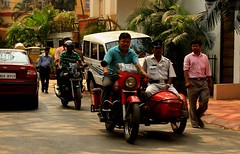Note: I had made this post to demand that The Sri Lanka Guardian take my unauthorized article off its website! Within 10 days of releasing this post, the newspaper took my article of its website. Thank you to everyone on Facebook and Twitter who helped by circulating this post and gave voice to my protests over the violation of my copyrights.
 A few days ago, I received tweets from people regarding an article of mine, published in The Sri Lanka Guardian. This was an article on Gandhi’s sexual abuse of young girls under his tutelage that I had published on Youth ki Awaaz (YKA), but I had not been approached by the Sri Lanka Guardian to reprint it, so I was surprised. The format, including the photo of Gandhi, was exactly the way it is on YKA, as was the author’s bio that YKA put up for me.
A few days ago, I received tweets from people regarding an article of mine, published in The Sri Lanka Guardian. This was an article on Gandhi’s sexual abuse of young girls under his tutelage that I had published on Youth ki Awaaz (YKA), but I had not been approached by the Sri Lanka Guardian to reprint it, so I was surprised. The format, including the photo of Gandhi, was exactly the way it is on YKA, as was the author’s bio that YKA put up for me.
I do write for YKA regularly, and there is a standing understanding between us that while I usually do not publish the same article on two sites, anyone approaching them for anything I’ve written should contact me directly. Still giving The Sri Lanka Guardian the benefit of the doubt, I checked my inbox for mails I might have missed, but found nothing. Then I asked YKA. They too were surprised, for they hadn’t been approached.
So I wrote to The Sri Lanka Guardian asking for an explanation. They said they had copied it off someone’s Facebook wall! When I put this to my legal counsel, he said this was absurd! Facebook is an informal platform for social sharing. However, The Sri Lanka Guardian is an official, commercial, publishing house, to which stringent copyright rules and publishing protocols apply. Even if they got it off Facebook (as they seem to claim they have), it has my name and bio on it, and as the author they should to have contacted me for permission before publishing it.
I wrote back to the Sri Lanka Guardian, relaying what I had been advised, and stated that I understood they had clearly violated my copyrights! Also on counsel’s advice I gave them two options to resolve the matter for me. Either they paid me what they did their columnists, or else within 48 hours (by May 07, 2014) they must remove my article from their site. They did neither! Instead they just stopped responding!
Copyright violations are something that writers and artists have to deal with all the time. And it is very frustrating to deal with, because (more…)













